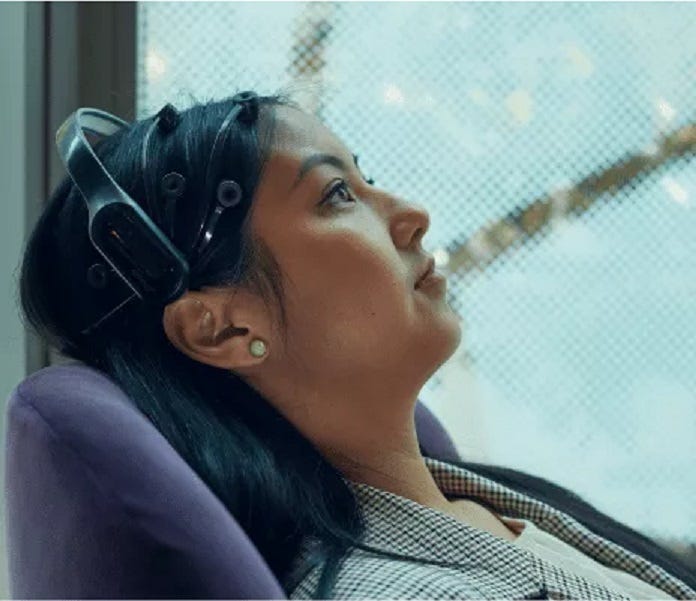Technology Will Take The One Thing Truly Ours In Exchange For Convenience
Beware giving up access to your mind for an easier life

“All your ecstasy in life is going to come from the inside, my ballet master had told me. I never understood what he meant, until Auschwitz.”
— Dr. Edith Eva Eger, The Choice
Ever since humanity developed the ability to think, we have gifted ourselves a special place to be free. It’s a haven from pain, torment, and fear. You can call it the only place truly our own, where no force can harm us.
What’s more, guides created entire philosophies to show us how to get there.
And they’re needed. Although only a thought away, we usually cover up the path to this special place with our own fear, disappointment, and distractions from the world around us.
Pain often prompts these guides. In fact, it’s usually a matter of survival. This inner world is the only place they can go to escape — a lone place where life is possible.
Names like Viktor Frankl, Epictetus, and Dr. Edith Eve Eger navigated this path through their own private hells, later teaching others that same way to freedom. But this haven might soon be closed forever.
We currently stand on a dividing line where the walls of this special place are coming down. While thoughts were once our private domain, technology is changing this. Not in the future, but now.
While it sounds like science-fiction, the ability to read a mind is within the realm of possibility. And the ease of convenience will drive us to it.
But before I show you the tech, it’s important to see what we’re truly losing.
Our Private Thoughts And The Inner Citadel
The philosopher and historian Pierre Hadot referred to our personal thoughts as “the inner citadel,” which “cannot be touched by destiny or the way things are since it is free to assent or not to assent to the judgments thought forms about presentations.”
Dr. Edith Eger, in The Choice, reveals her mother put it in simpler words: “Just remember, no one can take away from you what you put in your own mind.” And the former ballerina put it in practice within Auschwitz.
Her first day involved multiple encounters with a cruel Nazi doctor. He heard she was a talented dancer and forced the terrified teenager to dance for him in front of a band of inmates, like a wind-up toy.
She’d later learn this terrifying man was Josef Mengele, “The Angel of Death,” and he earlier had ordered her parents to the line for the gas chamber. So, Eger’s routine literally meant survival.

She retreated to that special place, pretending she was at a recital in Prague, miles from her present hell and performed flawlessly. This kept Eger and her sister alive. She’d rely on that inner citadel to survive the war.
Likewise, Holocaust survivor Viktor Frankl went to the same special place. In Man’s Search For Meaning, he recounts imagining himself giving psychological lectures to future colleagues about his time in the camps.
He found escape and choice in the one place his captors couldn’t go: his mind. According to Frankl, “Everything can be taken from a man but one thing: the last of the human freedoms — to choose one’s attitude in any given set of circumstances, to choose one’s own way.”
Two thousand years previous, the Stoic philosopher Epictetus found the same citadel during his time as a slave. He states sickness may hinder your body, but not your will to think freely, unless you choose it. Ultimately, even if Zeus shackles your leg, your thoughts can’t be overpowered.
Well, until now. We have the technology to smash that inner citadel to bits.
Giving Up Privacy Of Thought For Convenience
“The only person who has access to your brain data right now is you…But once you put a device on your head … you’re immediately sharing that data with whoever the device manufacturer is, and…It could also be shared with any government or employer…”
— Nita Farahany — Technology Review
In her interview on the Jordan Harbinger Podcast, Duke Law Professor Nita Farahany explains existing wearable tech can read and decipher brain waves. Moreover, it goes beyond the rings that monitor sleep and vital signs.
For instance, EMotive makes several EEG wireless headsets that work through Bluetooth for under $900. They say it can measure six different cognitive states in real time — excitement, interest, stress, engagement, boredom, and relaxation.
A user can also control devices with their brain. Obviously, this can be an amazing improvement for someone physically disabled, and convenient for us moderns too lazy to type or swipe. The latter has encouraged Meta (Facebook) to invest into the tech as well.
But put the lazy aside for a minute. What do you think a nefarious actor could do with that? Well, you don’t have to wonder. China’s government is having a regular Communist party with it.

Researchers there claim they’re using mind-reading tech to monitor Communist Party officials, so they stay “grateful to the party.” There’s also the industrial collaborative robots, which can read a worker’s brainwaves and hand them whatever tool they require with almost total accuracy.
Then, there’s the sensing devices being used to track down pornographic images on their version of the internet, which are illegal in China.
Farahany also talks about instances of these devices being used to monitor students and employees, punishing those not fully engaged in their work. But she sees even darker possibilities. In her interview Farahany says:
“I worry about the chilling effect on the variability to think freely, to dare to think freely, and the conformity…the kind of inner silence that can result from that.”
Inner silence? I hear pounding. It’s a battering ram smashing against the door to our inner citadel, and it won’t be long until the special place which has protected humanity for ages may be gone.
So what do we do?
Protecting Our Citadel
Farahany says Pandora already opened the box. The tech is here. But we have a short window before it’s commercially present everywhere. This time must be used to lay down ground rules.
Governments and society need to figure out how to protect our ultimate place of privacy and set limits. Farahany thinks we have a year or two. She explains a set of brain wave-reading earbuds are coming soon.
But I have another idea; one you’re not going to like.
A few years ago a relative got me an Amazon Alexa device that’s still in its box. I refuse to use it. Perhaps Orwell’s Nineteen Eighty-Four made me paranoid, but I’m not a fan of a listening device sitting in my house.
And this is where it gets hard. When tech companies show you that magical device which enables you to click, swipe, and change the channel — without the ever so exhausting labor of moving your finger — don’t buy it.
Not only don’t buy it for yourself, but avoid it for Christmas gifts. Do you know what stops a product dead? A massive loss of money.
Convenience is an easy sell, but please don’t buy it. You’ll be selling access to that one place which is truly ours: the citadel Frankl, Eger, and Epictetus escaped to. The same special place they’ve guided us to as well.
Furthermore, depending on the government or tech moguls to save you isn’t an answer. After witnessing their actions over the past couple of years, don’t expect it.
Beware giving up access to your mind for an easy life, or technology will take the one thing truly ours in exchange for convenience.
- Originally posted on Medium 4/10/23


